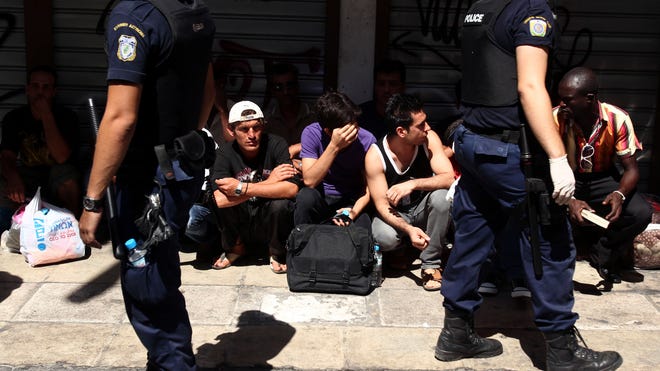 |
| Via Voice of Russia |
One 17-year-old, who fled Libya without her family in 2009, said: “I have to do things that make me sick and ashamed for a few pounds, sometimes even pennies - just so I can eat or get somewhere to sleep for one night.” (The Week)(If you live in the UK you can watch the clip here.)
This is obviously a horrible problem, but I can't help but wonder: what is the deal with calling all of these kids stateless?
New figures show at least 600 children in the capital are stateless — without a passport or official documentation linking them to their country of residence — and campaigners fear that number is rising.As we know from the 1954 Statelessness Convention, the definition of a stateless person is "a person who is not considered as a national by any state under the operation of its law" (Art. 1). Not possessing a passport or documents might be a feature of statelessness, but its not enough. For example, Ugandan boy Tony, above, has a Ugandan father who kicked him out of his home at age 14. So although he is in an awful, heart-wrenching situation, Ugandan boy Tony is not "stateless", he is more likely Ugandan, and undocumented.
Many of London’s stateless youths came to the UK legally but were never officially registered, meaning they cannot access education or apply for social housing. For teenagers like 17-year-old Ugandan-born Tony, attempting to become a legal citizen retrospectively can be virtually impossible. (London Evening Standard)
I bring this up because it may hurt the cause to call all these children stateless when in fact they are more likely "legally invisible," at risk of statelessness, or undocumented. The international human rights laws and UK immigrations laws applying to those groups are different, and are not as generous. If Tony were in fact stateless, and born in the UK, he would have a right to citizenship there that would simplify his problems tremendously. However, being legally invisible or undocumented he has limited options, at least under migration law. And that is a real problem- one that deserves more attention given the human rights issues at stake for these children.
The presence in each of these pieces of a disclaimer that most of the kids actually arrived in the UK legally suggests the reason for such a misnomer. If the kids were "illegal immigrant" homeless, would it be a news story? Does anyone feel sorry for kids with more complicated immigration issues, who aren't refugees or stateless?
If the public is outraged or concerned about this problem, it certainly doesn't help to call it something else to arouse additional sympathy. Its not necessarily the UK's "Homeless Stateless Kids" problem... might be more like the UK's "Homeless Kids" problem. And whether these children are actually stateless, legally invisible, or undocumented, don't they deserve some help in getting off the streets?
Read More:
Mapping Statelessness in the UK (Report from UNHCR and Asylum Aid)
Interview: Nando Sigona of Refugee Studies Centre (The Voice of Russia)
No Home, No Country, No Future: The 600 Stateless Children Living on London's Rough Streets (Evening Standard)
Hundreds of Stateless Children Live on UK City Streets (The Week)
And meanwhile, a report from Greece doesn't mince words: Teenage Migrants Trapped in Greece (IRIN)





















